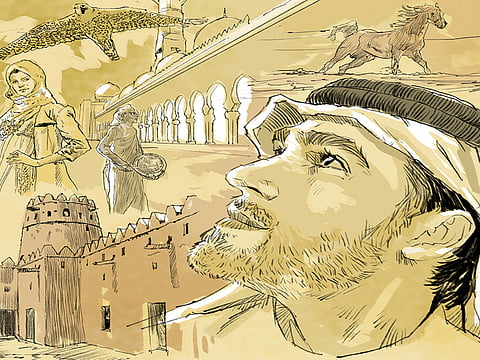Time to promote Gulf brands
Cultural products, labels and brands from the Arab Gulf states stand for quality and have a strong appeal throughout the region

There is this nagging concern among many in Arab Gulf states that our national heritage, deep-rooted culture, values, social relationships and old way of life are threatened by forces of globalisation, fast modernisation and demographic imbalance where nationals are increasingly becoming minorities in their own countries.
This concern is undoubtedly legitimate and should be taken seriously. Inevitably, something very dear gets lost in the grand process of modernisation and globalisation nearly everywhere.
The cultural and identity loss is the most touchy and problematic of all.
Yet there is this inherent tendency to exaggerate the vulnerability of Gulf society and culture to a myriad forces of change. Many tend to consistently underestimate the resilience of the century-old Gulf way of life. In so doing they only serve a typically conservative political and ideological agenda.
The experience of the last 40 years suggests otherwise. It clearly shows that Gulf culture is not as weak and vulnerable as many assume. Gulf states have proven to be remarkably durable, flexible and adaptable to the fast pace of social change. They have managed to simultaneously modernise and preserve their traditional ways of life.
The great majority are adamantly proud of their Gulf identity, which is constantly reinforced by tangible success stories — notably the case of the UAE. In other more conservative Gulf societies, they have turned ever more conservative today than they were a decade ago.
Appearances aside, and despite the massive societal transformation, there is as much continuity as there is change in most Arab Gulf states. The old way is still considered the best way by a sizeable segment of society who have no intention of easily giving in to the fast pace of change.
Pushing boundaries
But while forces of tradition are protective of old ways, the new liberal middle class is a formidable force that is changing Gulf society and culture beyond recognition. This confident and energetic social segment is pushing the boundaries with the full consent of ruling families.
They are spearheading a silent cultural revolution and a renaissance currently being experienced in many Arab Gulf states.
The result has been no less than an impressive contemporary culture renaissance enough to make a compelling case that Gulf cities such as Abu Dhabi, Dubai, Sharjah and Doha are now the new cultural, educational, media and diplomatic centres of the Arab world while the traditional Arab metropolises of Cairo, Beirut, Baghdad and Damascus are fast fading away as old centres of creativity.
Gulf fashion, songs, novels, museums, art, paintings, films, IT, media, education and drama are just few examples of the rise of the soft power of the Gulf in contemporary Arab history.
Today Gulf cultural products, labels and brands stand for quality and have a strong appeal throughout the region. This fact challenges the conventional wisdom that Gulf culture and national identity is facing a crisis and is under attack. Far from being threatened, Gulf culture is healthy and is becoming attractive and trendy, having acquired a market value of its own merit.
The Gulf cultural renaissance has been around for a while and is part and parcel of an evolving historical process called the Arab Gulf State Moment in Arab history. It is a unique moment whereby the six Arab Gulf states have become net exporters of soft and hard influence in the region.
For the first time in recent memory, the periphery has more influence over the centre — meaning the rest of the Arab world — not vice versa.
The economic leg of the Gulf moment is the most visible and has been around for a while. Gulf economies make up more than 60 per cent of total Arab GDP. The largest Arab economies today are Saudi Arabia, the UAE and Qatar, respectively — not Egypt, Algeria or Morocco.
Gulf capital, mostly private has penetrated the entire Arab world. The political leg of the Gulf moment is becoming ever stronger, with Riyadh and Abu Dhabi acting as the de facto political and diplomatic capitals of the Arab world and the GCC taking over from the impotent Arab League. Even the military leg of the Gulf moment has joined in the strongest fashion lately. The UAE has taken the lead on this front more than other Arab Gulf States.
Bolstering the cultural leg
The cultural leg of the Gulf moment seems the weakest and the least attended to. Whether it is continuity or change, modern or tradition, global or local or the perfect blend of all, it is time to strengthen and actively promote the cultural leg of the Gulf moment.
Gulf brands and cultural products stand for quality. The marketing of the Gulf labels could be done in tandem with the rise of what Adam Hanieh calls the Khaleeji Capital regionally and the emergence of the tourist sector of Gulf economy.
The soft power of the Gulf moment is full of potential and is waiting for entrepreneurs and investors to cash in. There is no better time to attend to Gulf cultural products and brands than right now.
Credit: Dr Abdulkhaleq Abdulla is a professor of political science. You can follow him on Twitter at www.twitter.com/Abdulkhaleq_UAE.
Sign up for the Daily Briefing
Get the latest news and updates straight to your inbox



